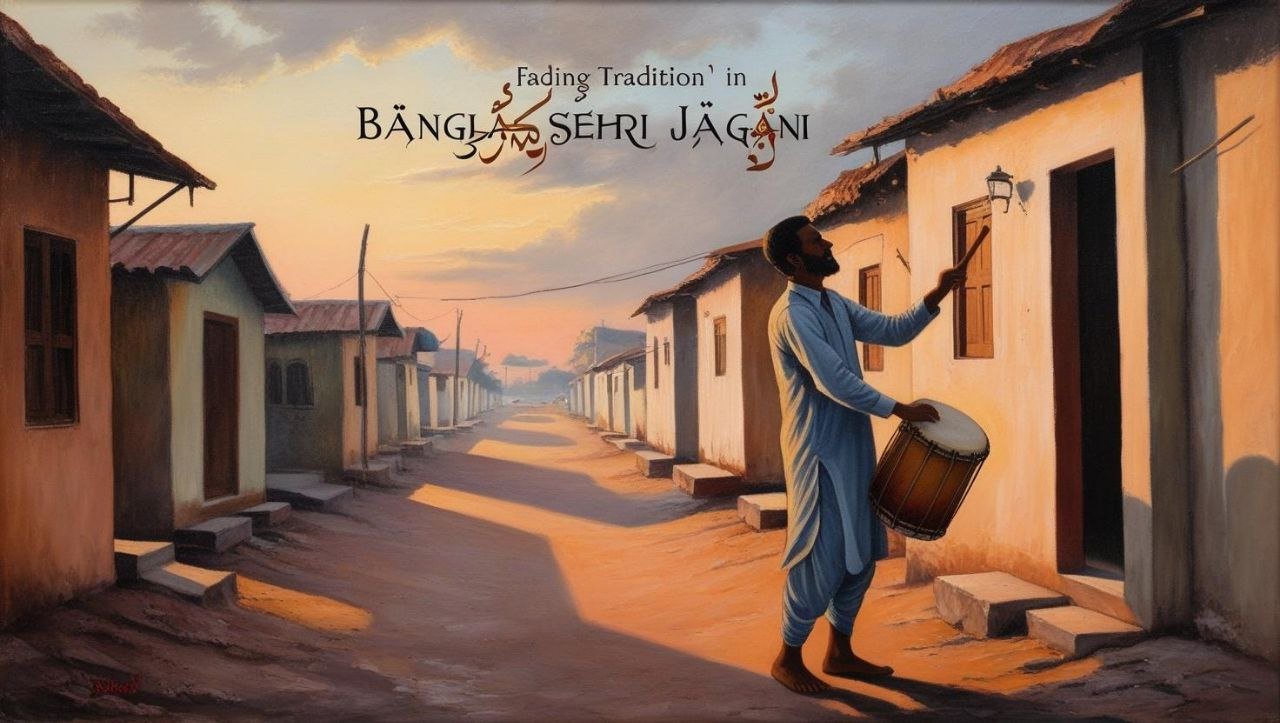Exploring the fading legacy of Ramadan’s melodic wake-up callers and their cultural significance in Bangladeshi society.
The holy month of Ramadan is very important for Muslims all over the world. During this month, they fast from dawn to sunset, avoiding food and drink throughout the day. It is also a time for spiritual reflection, prayer, and self-discipline.
One of the most important parts of Ramadan is the pre-dawn meal called sehri (or suhoor). This meal gives people the energy they need to fast throughout the day. In Bangladesh, a special tradition developed to help wake people up for sehri. Sehri jagani, or Ramadan wake-up callers, used to walk through the streets beating drums and chanting to make sure everyone was awake in time to eat.
This tradition was once an important part of Ramadan life in many communities. People relied on these wake-up callers to start their fast on time. However, with the rise of alarm clocks, smartphones, and changing lifestyles, this centuries-old practice is slowly disappearing. Today, fewer people hear the sound of drums in the early hours of Ramadan, as technology replaces this once-vibrant custom.
Origins and Cultural Significance
The tradition of sehri jagani in Bangladesh dates back several centuries, deeply rooted in the country’s Islamic culture. Before the advent of modern timekeeping devices, these drummers played a pivotal role in waking residents for sehri. They would traverse the labyrinthine alleys of cities like Dhaka, beating drums and singing melodious chants, often infused with religious poetry and local folklore. This practice not only served a functional purpose but also fostered a sense of community and spiritual ambiance during Ramadan.
In Old Dhaka, for instance, groups of singers would walk through the alleyways, performing songs from the Qasida genre of Urdu poetry. Accompanied by traditional musical instruments such as dhols and khartals, they created a magical atmosphere in the dark alleys of the night. The rhythmic beats of the drums and the voices calling for the faithful to wake up brought a sense of unity and devotion among the residents.
The Role of Sehri Jagani
The sehri jagani were more than just human alarm clocks; they were integral to the social and cultural fabric of Bangladeshi society during Ramadan. Their nightly rounds were anticipated events, bringing a sense of rhythm and continuity to the holy month. Children and adults alike would listen for their approach, and their presence reinforced communal bonds, reminding everyone of the shared spiritual journey. These drummers became a symbol of Ramadan itself, representing the essence of togetherness and devotion.
Decline of the Tradition
Despite its rich history and deep cultural roots, various factors have led to its steady decline. Modern technology, urbanization, economic challenges, and security concerns have all contributed to the disappearance of this centuries-old practice.
Technological Advancements
The biggest reason for the decline of sehri jagani is the rise of technology. In the past, people relied on drummers to wake them up for sehri, but today, most people use smartphones, alarm clocks, and smartwatches for personalized wake-up calls. The convenience of setting multiple alarms has reduced the need for human wake-up callers, making the tradition less relevant in modern households.
Urbanization and Modern Lifestyles
As cities expand and modernize, the close-knit communities that once supported traditional practices are disappearing. In urban centers, the sound of drummers is often drowned out by traffic, construction, and other city noises. Additionally, people living in high-rise apartments and gated communities are less likely to hear or need external wake-up calls. What was once considered a community service is now sometimes seen as a disturbance, leading to a decline in the practice.
Economic Factors
Traditionally, sehri wake-up callers were compensated by the community at the end of Ramadan, receiving money, gifts, or food as tokens of appreciation. However, due to changing economic conditions, fewer people are willing to support or pay for this service. Many drummers, who once took pride in their role, now struggle to earn a living and seek more stable jobs instead. As a result, fewer people are willing to continue this tradition.
Security Concerns
Safety issues have also played a major role in the decline of sehri jagani. In many areas, people feel unsafe venturing out at night due to the risk of robbery, harassment, or police restrictions. Law enforcement measures in certain cities discourage nighttime activities, making it harder for wake-up callers to continue their practice. As security concerns grow, more and more drummers are choosing to stop their Ramadan tradition.
Current Status in Bangladesh
In recent years, the echoes of sehri jagani have faded significantly. Reports indicate that this once vibrant tradition is now on the brink of extinction, overtaken by smartphone alarms, urban isolation, and fraying social bonds. Interviews with residents of Old Dhaka, including those whose families have upheld the tradition for generations, reveal poignant insights into this cultural erosion. Many elderly individuals recall fond memories of their childhood, when waking up to the sound of the drummers was an essential part of Ramadan. Today, the younger generation is barely aware of this tradition, having grown up in an era dominated by technology.
Efforts to Preserve the Tradition
Recognizing the immense cultural value of the sehri jagani tradition, many communities and organizations in Bangladesh are actively working to preserve and revive this practice. With the decline of traditional customs due to modern influences, these efforts have become essential to keeping the tradition alive for future generations. Several initiatives, ranging from cultural festivals to community-based projects, aim to ensure that the legacy of the Ramadan wake-up callers continues to hold significance in the cultural landscape of the country.
Cultural Festivals and Events
One of the key efforts to preserve the sehri jagani tradition is through cultural festivals. In various regions, these festivals have incorporated traditional wake-up drummers as part of their celebrations, offering younger generations an opportunity to experience and appreciate this age-old practice in a modern context. By introducing the sound of the sehri drummers alongside traditional music, folk performances, and dance, these events provide a platform for the community to reconnect with their cultural roots. Such festivals help raise awareness about the importance of Ramadan customs while allowing them to evolve in the face of modernity.
Media Documentation and Awareness
In today’s digital age, media documentation plays a crucial role in preserving cultural traditions. Documentaries, news articles, and social media campaigns have been instrumental in highlighting the significance of the sehri jagani tradition. Local television channels and online platforms have featured stories showcasing the lives of wake-up callers, shedding light on the challenges they face and the vital role they play in Bangladeshi culture. These media efforts not only educate the public about the art of the drummers but also inspire people to support the continuation of this practice. By sharing stories of these dedicated individuals, media outlets are ensuring that the sehri jagani tradition is not forgotten.
Community Initiatives and Support
Another important effort to preserve the sehri jagani tradition is through community-based initiatives. Local organizations, mosques, and neighborhood groups have come together to ensure that wake-up callers are compensated fairly for their services during Ramadan. In some areas, communities have collectively funded the drummers to ensure they continue making their rounds each night. This grassroots support reflects the deep-rooted appreciation for the tradition, as people recognize the significance of sehri jagani as part of the Ramadan experience. By providing adequate compensation and recognition for their contributions, these initiatives help ensure that the practice remains alive despite the modern challenges it faces.
Despite these efforts, the future of the sehri jagani remains uncertain. The continued reliance on technology and changing societal structures pose significant obstacles to its survival. However, the enduring efforts to preserve it reflect its deep-rooted significance. As with many cultural practices, adaptation and appreciation by younger generations will determine the future of the sehri jagani. By integrating elements of this tradition into modern life and fostering awareness among the youth, there is hope that this melodic wake-up call will continue to resonate through the streets during the holy month of Ramadan.
The sehri jagani symbolize a profound connection between faith, culture, and community in Bangladesh. Their rhythmic calls before dawn have, for centuries, been an integral part of the Ramadan experience. While modernity poses challenges to the survival of this tradition, the efforts to document, celebrate, and support it offer hope for its revival. By embracing both technological advancements and cultural heritage, Bangladesh can strive to keep the legacy of the sehri wake-up drummers alive, ensuring that future generations experience the magic and unity that these callers brought to the holy month of Ramadan.
As we reflect on the vanishing tradition of sehri drummers, it’s also worth exploring how iftar customs in Bangladesh have evolved over the centuries. Read on to The Evolution of Iftar Traditions in Bangladesh: From Mughal Era to Modern Times







